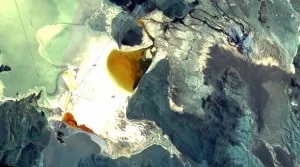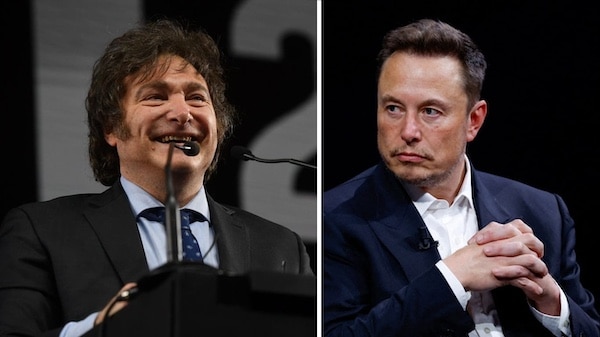He went to Davos to introduce himself to the world at the World Economic Forum. To Israel and Italy to strengthen his international position. To Washington to meet with Donald Trump, to Texas to meet with Elon Musk at his Tesla factory, and to Los Angeles to shake hands with Silicon Valley heavyweights. And he ended up in Madrid to close ranks with VOX. Javier Milei’s first six trips after winning the Argentine elections were a declaration of intentions, not only political and ideological, but also economic. Beyond rhetorical gestures and political fuss, the president has a clear agenda: to open Argentina’s doors to foreign investment at any cost.
In parallel to his travels around the globe, the government born out of the elections of October and November 2023 has launched a large number of legislative reforms with the same objective, some of them with serious environmental implications. The first major regulatory package, baptized as the Omnibus Law, sought to repeal the Native Forest Protection Law and the Glacier Protection Law, although both reforms eventually fell out of the proposal after strong internal and external pressures (including a warning from several UN human rights rapporteurs).
What the new far-right government did end up pushing through was a reform of the Land Law—which no longer limits the possession of land by foreign individuals and legal entities—and the Incentive Regime for Large Investments (RIGI), which puts the environmental and social sovereignty of Argentina’s provinces at risk. “Milei sees environmental, labor or human rights standards as an impediment to investment and development,” explains Pia Marchegiani, director of environmental policy at the Environment and Natural Resources Foundation (FARN).
In the midst of the reformist agenda of Milei’s government, there is one strategic resource that shines above the rest and takes us back to Silicon Valley and the office of Elon Musk and many other tech tycoons: lithium.
Who wants Argentina’s lithium?
Chile, Bolivia and Argentina form the three corners of the lithium triangle, a region that concentrates around half of the known reserves of this metal worldwide, according to data from the U.S. Geological Survey. Moreover, these are high quality and easily accessible reserves, since lithium is dissolved in brines, waters with a high salt concentration characteristic of the Andean salt flats. In fact, an estimate by the National University of La Plata indicates that the triangle concentrates 85% of the planet’s easily extractable lithium reserves. In Argentina, these reserves are concentrated in the provinces of Catamarca (Salar de Hombre Muerto, Salar de Antofalla), Salta (Salar del Rincón) and Jujuy (Salar de Olaroz, Salar de Cauchari).
Lithium is not a particularly scarce metal in the earth’s crust, but its demand has skyrocketed in recent years, fueled mainly by the growing battery industry for digital technologies and electric mobility. The International Energy Agency estimates that global demand for this metal related to the energy transition rose from 200,000 tons in 2021 to 325,000 last year, and will grow to 2.5 million tons by 2040. Faced with this scenario, Argentina—which is the fourth largest producer worldwide—has long had the objective of multiplying its mining activity. And it wants to do so, to a large extent, with the help of foreign capital.
“Even before the arrival of Javier Milei, Argentina had a very permissive legislation with foreign capital, setting few limits and obtaining very few benefits for the Treasury and the communities in exchange for the extraction of raw materials with almost no restrictions,” says Ernesto Picco, researcher at the National University of Santiago del Estero. Pia Marchegiani agrees with this diagnosis and points out that there are more than 40 mining projects in different stages of processing supported by giants of the automobile, fossil fuel and electronic components industries in the United States, Europe, China, Japan and Australia.
According to FARN’s board of directors, many names are familiar to all of us: Tesla, Toyota, Volkswagen, BMW, LG, Samsung or BP. Others, such as CATL or ByD, the two big Chinese battery manufacturers, are less well known, but no less important. “Speaking specifically of Elon Musk, he has long had his eye on the region’s resources for the batteries for his Tesla,” adds Picco.
In fact he already has negotiations with companies operating in Argentina, such as China’s Ganfeng or U.S.-based Livent. And now it clearly benefits him to have a president who is going to give priority to foreign companies over the inhabitants of the territory.
In fact, Musk has been the tycoon who has been the most explicit in his support for Javier Milei, both before and after the elections. He has done so, as usual, through X (which before he bought it was called Twitter), with messages as clear as “I recommend investing in Argentina”. “Musk and Milei are two like-minded people, I don’t know if by political ideology, but certainly at the level of discourse and of stirring up controversy through social networks,” Marchegiani points out. “Beyond this, I believe that one has a clear commercial interest in selling Argentina’s lithium and the other in accessing a key resource for his business strategies,” he adds.
The case of the Salar del Hombre Muerto: the law versus social agreement
Located in the south of the Puna de Atacama, the Salar del Hombre Muerto is one of the most important lithium deposits in the world. Mining began there in 1997. Since that same year, the indigenous communities living in the area began to see the obvious damage that mining and the lack of environmental control caused to ecosystems, water sources and their livelihoods. After more than two decades of struggles, threats and pressure of all kinds, the communities succeeded last March in getting an Argentine court to suspend the granting of new mining permits in the area.
“The legal reforms proposed by Javier Milei and largely included in the RIGI liquefy any process of social dialogue and indigenous consultation and generate a framework of greater criminalization and greater conflict,” says Pia Marchegiani.
This, surely, does not translate in the long term into greater stability for investors, as the case of the Salar del Hombre Muerto shows. If one does not take into account the social demand and what the communities want, one risks that all projects and decisions end up being discussed in the realm of justice.

Salar del Hombre Muerto lithium mine in Argentina.
Deregulation to favor lithium mining is also behind the social outburst in the Argentine province of Jujuy (where Salar de Olaroz and Salar de Cauchari are located). The reform of the province’s constitution last year to enable new mining areas in the Andean altiplano sparked strong protests among indigenous communities, which were violently repressed by local authorities. The situation, with the new political context, does not look set to improve.
“Lithium was already a key resource before Milei. We are in a process of production expansion that will surely bring many changes in the region, and not all of them will be good,” concludes Ernesto Picco.
Milei’s new laws go a little further and leave local communities and, in particular, indigenous communities at the bottom of importance in the face of development and investments. It is part of the philosophy of this government. It is enough to remember Milei’s statements during the campaign where he said that a company that invests and produces has the right to pollute a river as much as it wants.
“For me, this debate has two central issues. One is that of demand: is it really the way to solve the climate crisis for everyone in North America or Europe to have access to an electric car?” reflects Pia Marchegiani.
The other is that of North-South justice and justice with indigenous peoples. There are countries that have contributed much more to the problem and are now also appropriating resources for the supposed solutions. And indigenous communities have been adapted for centuries to live in ecosystems that they care for and respect and that we are now going to sacrifice in order to theoretically solve climate change. I think we need to seriously rethink how we are going to get out of this crisis.

